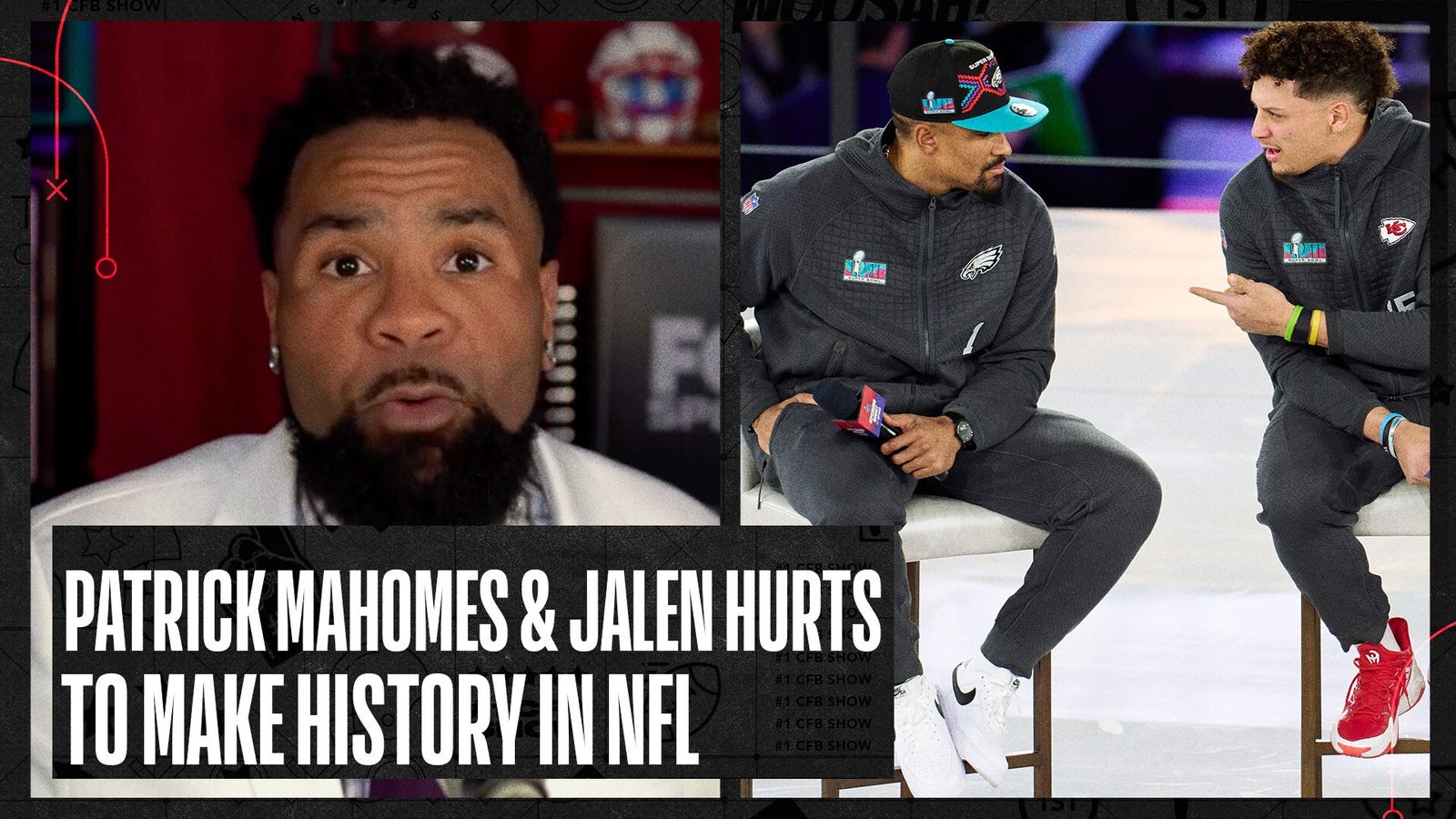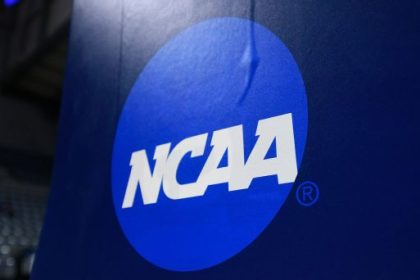Patrick Mahomes and Jalen Hurts will make history Sunday in the first bowl Super Bowl matchup to feature two Black starting quarterbacks.
This is an important moment that carries tremendous significance for me, because for the first time in my life when it comes to a Super Bowl, I can’t lose.
But it’s important to not treat this moment as trite, or rosy. It’s important to acknowledge a 70-year history of Black quarterbacks in the NFL who never got their shot. It’s important to remember those who played a role in the long, arduous journey to get to this point because this moment will not just mean so much to them but to their families and the many who cut a path to Sunday.
What follows here are factual statements. I’ll let you know when we get to my opinion.
ADVERTISEMENT
Mahomes is the youngest player ever to win an NFL MVP, a Super Bowl MVP, and a Super Bowl. He was 24 when he first achieved that. He is a Black quarterback.
The year before Mahomes won the Super Bowl, Lamar Jackson became just the second player to win NFL MVP by unanimous vote. The only other unanimous pick for NFL MVP is Tom Brady.
Despite the careers of Doug Williams, Randall Cunningham, Steve McNair, Donovan McNabb and Michael Vick, Warren Moon remains the only Black QB in the Pro Football Hall of Fame.
Only three Black quarterbacks have won the Super Bowl — Mahomes, Williams and Russell Wilson.
In 1969, James “Shack” Harris became the first Black QB to start a season-opener in the NFL — 15 years after the Supreme Court overturned segregation, 50 years after the NFL was founded and a full year before the NFL-AFL merger in 1970.
Jalen Hurts and Patrick Mahomes to make NFL history
RJ Young shares his insights on the history being made in Super Bowl LVII.
Fast-forward 50 years to 2019, when four of the eight teams to make the divisional round in the NFL playoffs were led by Black quarterbacks. That also marked the first time two Black QBs were named to the AP All-Pro Team, and the AP has been picking All-Pro teams for more than 80 years.
In 1927, Duke Slater, whom the Iowa Hawkeyes honored by naming their field after him, was the only Black player in the NFL. By 1933, there were none, and it would stay that way for the next 12 years. This also came at a time when, however briefly, teams were penalized for things like too many incomplete passes.
The first Black quarterback didn’t take the field in the NFL’s modern era until Oct. 8, 1953, when Chicago Bears QB Willie Thrower was ushered into the game in relief of George Blanda in a 35-28 loss to the San Francisco 49ers.
Thrower was one of the best high school players in the country in 1948. He said every college in the country wanted him until they found out he was Black. Only Michigan State stood by its offer.
Wisconsin became the first Big Ten program to field a Black QB in 1956 when Sidney Williams, Jr. took the job. Sandy Stephenson, a Black QB at the University of Minnesota, led the program to a Rose Bowl appearance and the 1960 national title. Jimmy Raye II, a Black QB, led Michigan State to a national title in 1966. Chuck Ealey, a Black QB, famously went undefeated in three seasons at Toledo. But neither Stephenson, Raye nor Ealey played QB in the NFL.
The SEC didn’t field a Black QB until Tennessee tapped Condredge Holloway for the gig in 1972, five years after Kentucky’s Nate Northington became the conference’s first Black player.
The first Black QB to be selected No. 1 overall in the NFL Draft was Vick in 2001. The first Black QB to win NFL MVP was McNair in 2003. And Moon was the first Black QB enshrined in Canton in 2006 — two years before the first Black President of the United States was elected to office.
Black history is still being made in my lifetime, and I was 18 when the Moon was enshrined. He was booed as the starter at the University of Washington right up until he delivered the Huskies a Rose Bowl win in 1978 — the same year Doug Williams was selected in the first round by the Tampa Bay Buccaneers.
Moon won the Pac-8 MVP, was named Rose Bowl MVP in 1978, and went undrafted. This is 24 years after Brown v. Board of Education was overturned. Moon won five Grey Cups as a QB in the CFL before the Houston Oilers signed him in 1984.
Tony Dungy won team MVP at Minnesota as a QB. Both he and Moon have said that they went undrafted because they refused to play a position other than quarterback. Dungy eventually acquiesced and played safety for the Pittsburgh Steelers, where he won a Super Bowl in 1978.
I’ve written at length about another Tennessee State QB, Eldridge Dickey, and how his talent was wasted in the NFL.
[Eldridge Dickey was the greatest HBCU quarterback of his time]
Marlin Briscoe won two Super Bowls as a wide receiver with the Miami Dolphins, including as a member of the famously and singular ’72 Dolphins. But that only happened after Lou Saban gave him a taste of playing QB for the Broncos in 1968, then moved him to wideout, and then moved him on.
Briscoe has said he never got over not being allowed to play his career as a QB. He picked up a drug habit and pawned his Super Bowl rings.
Now, here is my opinion:
I’m telling you all of this to underscore why it’s important to honor these moments in the present. These are the stories we know. There are hundreds we don’t. When we write about these subjects where history is made along race and gender lines, some might thoughtfully ask … should we? Is this doing harm or is it helping? Should we act as if this was inevitable or a triumph?
I am in the camp with the former because in Black History Month, we’re still making history. I say this as a man who wrote a history book about the Tulsa Race Massacre just last year. When history stops being made, we can stop writing about it being made. But we must write about our history, anyway, so we never make the mistake of repeating it if only because we might forget it.
Doug Williams carried the weight of those stories in the NFL and USFL. Joe Gibbs pulled Jay Schroeder for Williams just before the 1986 playoffs began. In Super Bowl XXII, Williams threw for more than 340 yards and four TDs with one INT in Washington’s 42-10 whooping of John Elway’s Broncos.
For many, Williams winning the Super Bowl remains the most singular achievement by a Black QB. It is on par with Jackie Robinson breaking the color barrier in baseball and Jesse Owens winning the gold in Berlin. Historically, sports and going to war are where Black folks have had the best and most opportunities to prove who we are in America, what we are capable of, even when our humanity has been and is still questioned.
It’s why I am choosing to celebrate Hurts and Mahomes being the first pair of Black quarterbacks to start against each other in the Super Bowl. There’s a part of me that hopes they get a minute to bask in that moment with each other, apart from the noise, and realize they are now walking, talking Black history.
RJ Young is a national college football writer and analyst for FOX Sports and the host of the podcast “The Number One College Football Show.” Follow him on Twitter at @RJ_Young and subscribe to “The RJ Young Show” on YouTube.
Top stories from FOX Sports:
- Super Bowl Opening night: Best quotes from Eagles, Chiefs
- Pro Bowl Confidential: 27 players pick MVP, most underrated, coaches, other questions
- Tom Brady is the best thing to happen to the Patriots, even as he retires a Buc
- Is Chiefs DT Chris Jones the NFL’s most unheralded elite defender?
- ‘I was blessed to have Damar’: Eagles’ Miles Sanders shares bond with Bills’ Hamlin
- Eagles, Chiefs were best teams all season, setting up an epic Super Bowl
- Eli Manning to Bradshaw to Brady: Ranking 10 best Super Bowls ever
- 2023 NFL Draft prospect rankings: 64 best available players
- Signing day report card: Colorado, Oregon, Alabama, Texas shine bright
- Shohei Ohtani sweepstakes: Ranking every MLB team’s chances to sign him
- Mavericks, Mark Cuban gamble big with Kyrie Irving trade
- Super Bowl 2023 odds: lines for Chiefs Eagles; Philadelphia opens as favorite

Get more from College Football Follow your favorites to get information about games, news and more










